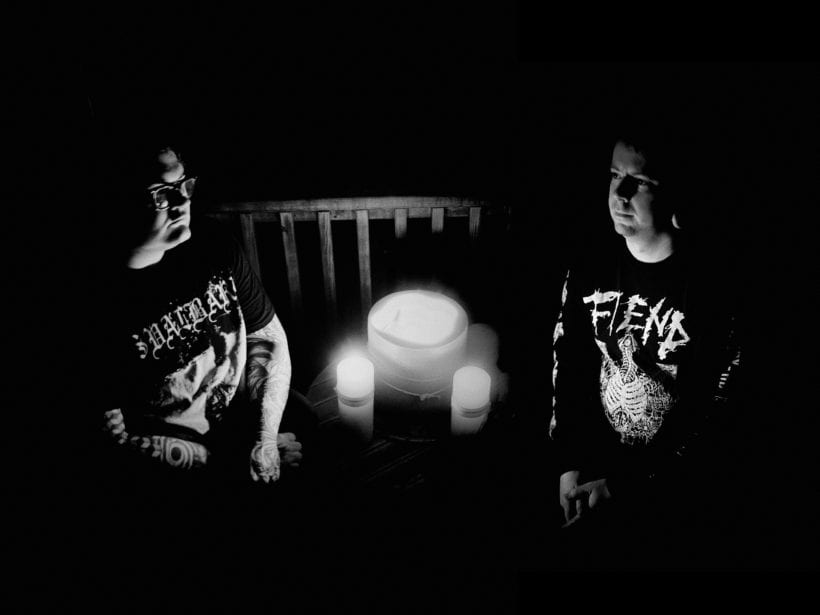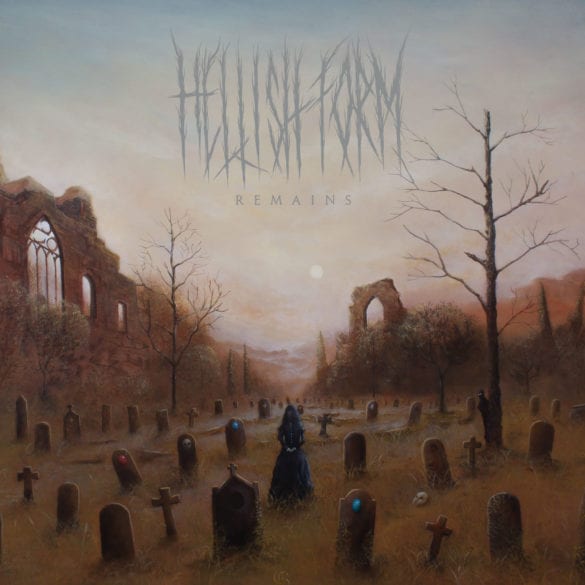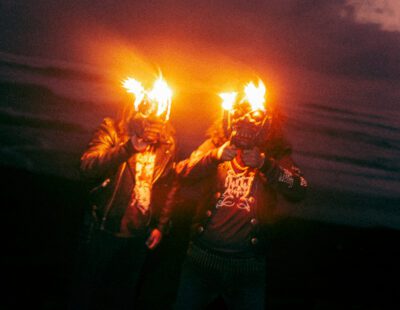
Willow Ryan and Jacob Lee are a powerful duo built on a strong relationship between songwriter and producer. Despite lockdown and 3000 miles of distance between them, Ryan and Lee craft synth-driven funeral doom as Hellish Form which channels the poignant and emotive tones of death and trauma. Their four-song effort, Remains, follows a debut EP in 2020.
Ryan and Lee’s friendship goes back a handful of years after being fans of each other’s music. Ryan plays in Body Void while Lee features in Keeper. They had discussed writing music together for some time, but it took until the events of the pandemic to really allow the two to come together and create Hellish Form.
Remains shows a wonderful blend of brilliant songwriting and astute engineering in one of heavy metal’s more challenging subgenres. Building immersive and affective funeral doom to life can be a tricky task for a band, let alone one that is situated on opposite corners of the country. Album standout, “Shadows With Teeth” exemplifies the pair’s cohesion and knack for song-crafting. Yet, the album as a whole is exceptionally written and delivered.
Listen to an exclusive stream of Remains and read an in-depth interview with Hellish Form‘s Willow Ryan and Jacob Lee now. Their album officially arrives tomorrow through Translation Loss Records.
You two go back a bit from what I’ve read. Your bands, Body Void and Keeper, recorded a split together and released it last year. You have also been fans of each other’s music and have had the chance to hang out in person. What sparked you two together to create Hellish Form?
WILLOW RYAN: I think it really started with Jacob recording another band of mine, Atone, back in 2018. We talked like we should just make some music together. I’ve always been a huge Keeper fan, so that would have been super exciting to me. It didn’t pan out until the pandemic gave us the opportunity to, even though I moved across the country.
JACOB LEE: I would say the same for me. It seems crazy how equally fans of each other we were. I remember when we first met, it might have been like a Fresno show where Body Void played.
RYAN: I think Body Void played and then we met after and I didn’t even know who you were. I forget how I figured out it was you, but I was like, “Oh shit. I have to ask him to do a split with us.”
Then I asked you not long after that to do a split and then that took a couple of years to get together.
LEE: I do remember we talked a little bit about it making a band because I remember leaving a restaurant and telling my fiancé, “Oh, man. Willow wants to do a project together!”
So this was a couple of years in the process, but it took COVID and quarantine to kind of get that to actualize?
LEE: Yeah, just to get that headspace and everything. Body Void is full-time for [Willow], so we had to make the time for it.
RYAN: The way we figured out the rhythm with writing stuff online and across the country worked really well. Like I think even if I was in California, we wouldn’t have gotten together. We would do the same kind of process.
What does that process look like for you with about 3000 miles between you two? What does the collaboration effort look like for you?
LEE: Sending files back to back to each other. Stacking riffs and melodies or restructuring things. Most of it was Willow’s layout. The entire song was almost put together. But all my bands do that. It’s all just emailing stuff back and forth to each other. It’s a process I’m so used to. It’s almost hard for me to do anything differently now.
RYAN: It was very new for me, but it clicked really quickly because the way we write the songs for Hellish Form is very additive. In Body Void, it’s just three instruments and writing the structure of the song and feeling it out in the living room. For Hellish Form, it almost feels like when I used to make electronic music.
You’re essentially looking at stacks of skeletal ideas that you send back and forth. Willow’s adding guitars or Jacob’s adding different layers of instruments and things like that.
LEE: Yeah, we’ll have a little note or document or something in the chat. One of us will say, “melody here, harmony here…” Or something like that. Then the other person will tackle that and get approval on it. Willow handles all of the synths, so I’ll just get back a bunch of tracks of synths if they’re not already in the initial base structure.

Jacob, you mentioned Willow’s synths. I noticed that’s a much bigger part of Hellish Form on Remains compared to your 2020 release. Was this a big goal for you two for this album? Also, were there other goals or ideas that you really wanted to include or expand upon for this new album?
RYAN: Yeah, the synths are always something we wanted to do and I definitely wanted to incorporate synths into doom. I think the first record had a very grayscale-like tonal palette. At a certain point, we just said, “let’s do something a little bit more funeral doom with the synths.”
LEE: In the EP from last year, the synths were a subtlety—more of a background—and with this, it’s a way more prominent feature. From my background, it’s not a sound I’m familiar with, so for me, it’s this uncharted territory—new cool sounds that I’ve worked with.
In Keeper, we’re always trying to get close to having these ethereal, beautiful parts and punches with the guitars. Having a sense there, I feel like we really got another level of emotion.
RYAN: It adds just another dimension. The mixing aspect of this album was so much more difficult than the first one because there were so many more synths. That’s what took forever because you have infinite possibilities and options.
That was when it was kind of a bummer not to be in the same room because we’d have to go back and forth on the most minor changes.
LEE: There are infinite tone bases, then those could be individually tweaked, and then we have different presets at each other’s homes. But I feel like it worked out pretty well.
I was reading through the lyrics of the album itself, and it seems to have been written from a very dark place. As far as lyrics go, it seems built around this notion of death, trauma, or things of that nature. With the album being written during the pandemic, does this notion of death stem from COVID, or is it from a more personal level of this idea?
RYAN: The level of loss and death was so overwhelming last year, and we, as a country or the world, still haven’t really acknowledged that. So, it felt like a way to acknowledge that. It had to be about death, basically.
Thankfully, I didn’t lose anyone close to me to the pandemic. The first song is about a funeral and speaking more metaphorically to the situation. The middle two songs, “Ache” and “Shadows With Teeth,” are definitely more personal. “Ache” is about isolation and “Shadows With Teeth” is about accepting trauma. Those are less directly related to the pandemic, even though they are super applicable.
What really helped the lyric writing was the songs themselves. The way they sounded and their emotions made writing lyrics really easy. It’s like, “Oh, this song is going to be about loss because the music itself feels like that.”
Whereas Body Void, it’s kind of the music is very like emotions are kind of heightened or muted.
Jacob, do the lyrics carry this personal or emotive weight for you as well?
LEE: Not really. I’ve always been more focused on the riff or the melody or the structure of a song. Every band I am in, I pass off lyrical writing to whoever I’m working with because I just can’t. There isn’t that much on my mind to put into words. I just like making the song. That’s why I got into recording and mixing because I like to put the pieces together.
But as for the emotion, both of us come from just like heavy, heavy backgrounds. Body Void especially is crushing all the time. I think we both really wanted to dive more into having pretty, somber, depressing, and uplifting melodies and songs.
So what does Hellish Form represent for both of you that your other projects like Body Void or Keeper don’t?
RYAN: For me, we want it to be doom. We want to be heavy and slow. But beyond that, I feel like it is a much more open canvas. For Body Void, I never want there to be a moment of prettiness. In the course of Body Void’s albums, you can see any semblance of melody getting chipped away until it’s basically riffs and noise.
It’s like Jacob was saying. Any kind of emotion is fair game. So, it’s a much broader canvas. If I come up with a song idea, it’s clear immediately which band it should be for because they both offer an outlet for these two sides of what I’m interested in.
LEE: For me, it’s basically just getting the chance to work with another amazing artist. Every group I get involved in, I always learn something about the creation of music. As a guitarist, I’m always very self-conscious about a riff that I write and I feel like I’ve always had to be busy or interesting with what I’m playing.
Hellish Form, if you look at it, the base roots of the riffs, they’re very minimal. So I have to challenge myself to find potential in the empty spaces, and then we fill those spaces with the synths or just like let the open chords basically ring and have that abyss, the sound abyss shine. I feel that’s like the biggest difference.
None of my bands sound as synthesized and huge. The climaxes on all those songs are so epic compared to how straightforward a lot of my other songs go. This is the synth-iest and doom-iest project, I have for sure.
RYAN: Yeah, I guess I didn’t appreciate this is your only doom project right now. Your main band right now is a grindcore band.
LEE: Yeah [laughs], it definitely is nice to have something slow to come back to.
That’s a bit of a 180 there. Yeah. So what, what sort of work do you both put in to approach these challenges that come with trying to create music that’s different than what you’re used to creating? Are you listening to other bands that fit into this realm or are you practicing different ideas on your instruments or learning new things?
RYAN: That’s a good question. It really is like an experiment and practicing stuff to see if it works. There is an aspect of, “I don’t know if this is going to sound right because I’ve never done it before with any of my other bands.”
As far as inspiration, there is a lot. Outside of heavy music, there are a lot of melody ideas. One of the things we did last year while we were recording Remains was to cover The Cure.
That kind of put in perspective for me. This kind of music can be really relevant to what we’re doing, even though it sounds really different. It is really informative. Then thinking about how do we incorporate these ideas into doom and that offers a lot of fertile ground for inspiration.
LEE: I just followed Willow’s lead and tried my best to keep up or contribute as much as I could because Willow was just a writing machine. A song would be almost complete when they would be sent over the first time. So I was just 100% on board with any idea that was put forward.
RYAN: Yeah, Jacob is basically the drummer. I come up with the basic patterns sometimes and then Jacob will make it sound like a real thing. Which is awesome, because I’m bad at programming drums.
LEE: Especially for this where it’s like ten-plus minute songs. You can’t just be doing a drum solo the whole time, but at the same time, you want to have it sound a little looser.
RYAN: I feel like there’s a little bit of a songwriter/producer dynamic between me and Jacob. I’ll have ideas and then Jacob will really add to them. “Shadows With Teeth” is basically written by Jacob, but then we put that together as a team and flesh it out as a song. There is that element of songwriter/producer, which is like the dream team.
LEE: Yeah, “Shadows With Teeth” was a couple of chords basically where I said, “Is this cool?”
I was not confident because again it’s super minimal on my end for what I’m playing. I’m like, “I feel like I need more for this to be a song, but maybe Willow will have an idea.”
Then Willow basically added the repeats—how long each riff would go for. Then I thought, “OK if that will work. If you think that those chords will be enough to carry it… This is too little, but I think there might be something here.”
Now I have some more ideas moving forward of how minimal we can be or what kind of tones and vibes I want to go for on future songs. I feel like that helps and I want to be able to add some more riffs.
RYAN: That was definitely one of my favorite things to work on that song because you had all the riff ideas and I basically just came up with, the structure and the drums and then added synths. Then you added some more—which sounded really sick. It just snowballed into what it is. That was definitely the most collaborative song and I could see it being people’s favorite song. I think it might be my favorite on the album.
If we look at your MMXX EP and then this is your first full-length record, where does Hellish Form go from here? When the pandemic kind of resolves do you have hopes to come together physically to work on things in maybe a bit of a hybrid/live/distance situation?
RYAN: I would love to play live. It would be interesting because we’d need more people than are in any of our bands to do it. But I think it’d be really cool.
LEE: I’m terrified of it, but I would love to do it eventually.
RYAN: Yeah, it is daunting. That’s one of the things about when you’re recording, especially for this project. You’re not really thinking about playing live at all. But I think it’d be a really fun challenge.
LEE: To recreate the song honestly we would need like four guitarists or maybe even a fifth on some parts. We would really have to rethink the songs to start doing this.
For future songwriting do you both want to try and bridge the 3000-mile gap and try to work together in person? You mentioned the mixing could have gone easier if you two were together in person.
RYAN: It’s pretty awesome the way it’s worked out. The only part that would be helpful to be in the same spaces is mixing, but I feel like even at this point we’re finding that rhythm online that works really well. So it’s almost like “don’t mess with the formula.”
LEE: I’m in bands with people in the same city and we still use the same process of online writing and collaborating. It’s just the most convenient process.
So, let’s do this. We take a hypothetical tour for Hellish Form. What bands would you want to see with Hellish Form’s first live performances?
LEE: This breaks my heart after the news that Willow sent me…
RYAN: Yeah, I was going to say the same thing… I think we’re both thinking Monarch, but they just broke up yesterday.
Oh, no!
LEE: Yeah, I think they were probably one of our biggest joint inspirations for this, so it’s a bummer.
RYAN: For me, I’d love to tour this with Un. Body Void toured with Un from Seattle. They were definitely an inspiration. But then if I could have anybody—Mournful Congregation, Shape of Despair, or, Evoken.
We’ve been writing newer songs post this album and a lot of it is even more influenced by Mournful Congregation for me.
LEE: Willow definitely knows more about that part of the heavy sphere than me. So I think my fanboy picks would be more on the sludgy side, like Indian or someone like that. We probably would be a little out of place, but more feedback and more sludgy riffs and here we are with these soaring synths.
All the bands I really, really love are no longer bands. I have to get a Khanate/Monarch reunion for my dream team.
RYAN: I think we could hang with both those spheres though. There’s definitely a sludge aspect to Hellish Form because of our backgrounds but the synths add another layer. It definitely has its own thing.






